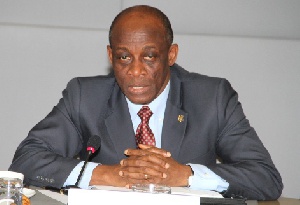 Seth Terkper, Minister of Finance
Seth Terkper, Minister of Finance
An economist with the Institute of Fiscal Studies has questioned Ghana’s new gross domestic product figures put out by the government, describing it as inaccurate.
At the presentation of a supplementary budget to parliament on July 25, government announced a decline in the country’s GDP ratio from 72 per cent to 63 per cent, which it said has also resulted in a decline in Ghana’s debt.
But a research fellow at the Institute, Leslie Mensah, who explained the dynamics in debt management to 3FM 92.7, rejected the figures by the government, saying ” we think that is inaccurate.” “The reason for the fall in the debt to GDP ratio between December 2015 and May 2016 is that we are using a nominal GDP to work out the ratio.
Every year, from January, we see the debt to GDP ratio fall because we change the base number that is used to work the GDP and that causes the change and not that some good factors have caused the change,” he explained.
Mr Mensah noted that the trend of weak economic growth, high inflation, high interest rates and debt unsustainability has not been reversed, adding that Ghana’s debt vulnerability could worsen as the government contemplates more external borrowing at an expensive cost.
He said that the cost of debt servicing is so significant. He added: “This year, expect that we will spend 64 per cent more money to retard debts, than for capital projects, so that’s another dimension of the debt problem,” he explained further.
“There hasn’t been any improvement to celebrate,” Mr Mensah advised the government He raised concern about the cost of debt service which he said “has jumped rapidly from representing just 10 per cent to more than a quarter of government debt”.